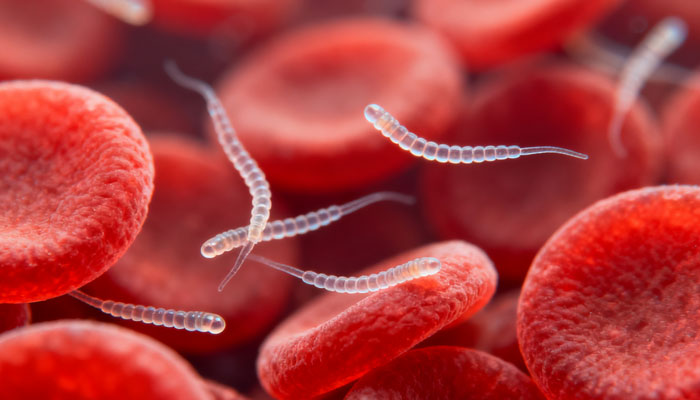Treatment for Canine Heartworm Infection

Heartworm poses a significant threat to canine health, with dogs of all ages susceptible to infection. This potentially fatal disease is primarily transmitted through mosquito bites, which inject infected blood into the host. Additionally, both cats and dogs can become repeatedly infected, underscoring the critical importance of regular preventive care for pets.
I. In-Depth Understanding
1. Transmission Mechanism
Heartworm transmission relies on mosquito bites as vectors. When a mosquito bites an infected dog, it ingests juvenile heartworm larvae. After 10 to 48 days of development within the mosquito, these larvae mature into infective stages. Subsequently, if a mosquito carrying these infective larvae bites another dog, that dog becomes infected. 2. Misconceptions About Infection Risk in Long-Haired Dogs
Some owners mistakenly believe that long-haired dogs’ fur effectively blocks mosquito bites, thereby reducing heartworm infection risk. This view is unscientific. Even if mosquitoes struggle to bite areas covered by a long-haired dog’s coat, exposed regions like the face and ears remain vulnerable. Mosquitoes can transmit the parasite by biting these areas. Therefore, owners of long-haired dogs must not neglect prevention against this disease.
3. Risks
Once heartworm larvae enter a dog’s body, they gradually develop into adult worms that parasitize the right ventricle of the heart and pulmonary arteries. As the number of adult worms increases, it causes pathological changes in the dog’s heart and lungs. This is akin to planting a dangerous “time bomb” within the dog, posing a constant threat to its life.
II. Effective Prevention Measures
Although heartworms can severely impact a dog’s health, they can be effectively prevented through scientific and reasonable methods. Below are several common prevention approaches:
1. Regular Administration of Preventative Medication
Owners should schedule routine health checkups at veterinary clinics and obtain appropriate preventative medication for their dogs. These medications not only protect against heartworm infection but also eliminate parasites in the dog’s stomach, providing an additional layer of health protection.
2. Use topical spot-on medications
Since heartworms are transmitted through mosquito bites, some veterinarians recommend applying specialized spot-on medications to the dog’s skin. These medications reduce mosquito attraction and bites while also repelling fleas, preventing their breeding and proliferation in the dog’s fur.
3. Notes on Preventive Vaccines
While a vaccine against heartworm exists, its use is uncommon in practical dog care. This stems primarily from the fact that consistent medication provides highly effective prevention, making vaccination less urgent.
III. Treatment for Heartworm Infection in Dogs
If a dog unfortunately contracts heartworm, prompt scientific intervention is essential to safeguard its health. The specific procedures and precautions are as follows:
1. Comprehensive Pre-Treatment Diagnosis
Upon suspicion of infection, a veterinarian must conduct a thorough diagnosis using methods such as ultrasound, X-ray imaging, and blood biochemistry tests. These examinations help determine whether the dog is suitable for drug therapy. If tests reveal poor liver or kidney function, medication is generally not recommended.
2. Treatment Protocol and Duration
Heartworm treatment typically follows this sequence: First, administer anticoagulant medication for 1–2 weeks. Next, inject medication to kill adult worms. Following the injection, the dog must continue taking the anticoagulant medication. The treatment duration varies based on the severity of the dog’s condition, ranging from one month to six months. During this period, owners must provide meticulous daily care for the dog.
3. Treatment Restrictions
During heartworm infection and treatment, dogs may exhibit lethargy and reduced appetite, requiring increased caregiver attention. Additionally, avoid situations causing emotional excitement or excessive exercise, as these can elevate heart rate. This may trigger the release of large numbers of dead adult worms, potentially causing vascular blockages and complications.
4. Reiterating the Critical Importance of Prevention
To protect dogs from heartworm infection, proactive prevention is paramount. Owners should schedule regular health checkups and administer preventive medication on time as part of routine care. If a dog unfortunately contracts the disease, subsequent treatment often demands significantly more time and effort. Therefore, prevention is far more crucial than treatment.
admin
-
Sale!

Washable Pet Cooling Pad for Cats and Dogs
$10.99Original price was: $10.99.$9.99Current price is: $9.99. This product has multiple variants. The options may be chosen on the product page -
Sale!

Washable Cat Window Hammock Cooling Bed
$23.99Original price was: $23.99.$22.99Current price is: $22.99. -
Sale!

Tropical Amphibian Rainforest Tank, Lizard Cage
$38.99Original price was: $38.99.$36.99Current price is: $36.99. -
Sale!

Silent 4-in-1 Waterproof Charging Dog Hair Trimmer
$49.88Original price was: $49.88.$47.99Current price is: $47.99.